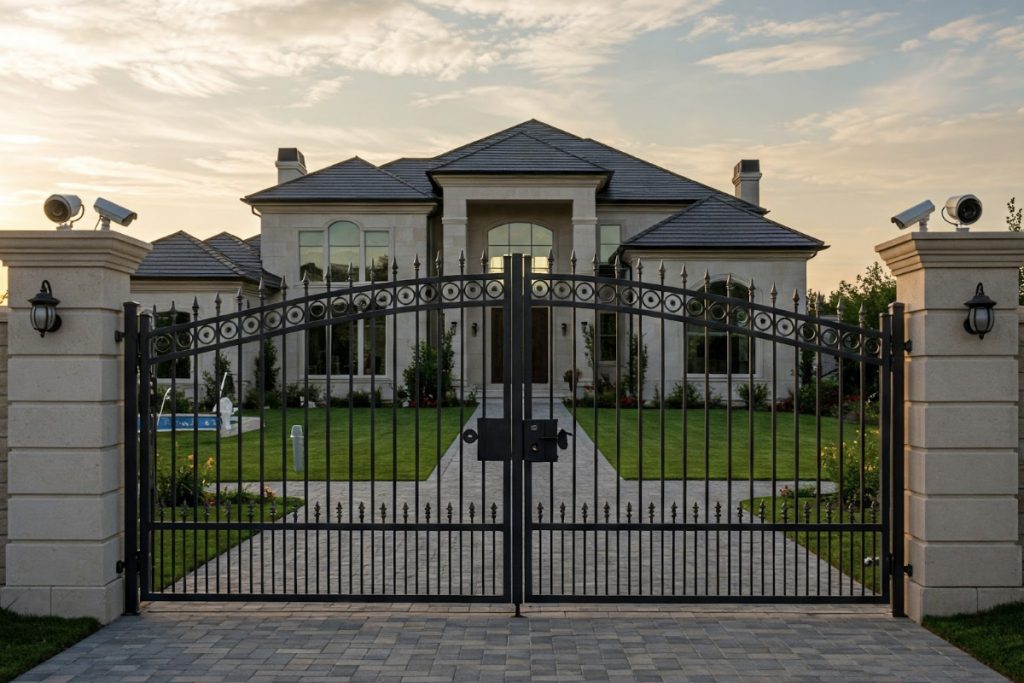| May 26, 2025
Security Measures the Ultra-Rich Take When Buying a Property

“I like large parties. They’re so intimate. At small parties there isn’t any privacy.” – F. Scott Fitzgerald, The Great Gatsby
For the world’s wealthiest, home buying considerations go beyond price range, location, and layout – safety, security, and privacy are also important aspects to consider when you have to contend with issues such as burglary tourism. As the Internet of Things (IoT) becomes increasingly connected, and the incentive to target ultra-high-net-worth-individuals (UHNWIs) remains, security and personal protection have to become paramount considerations in luxury real estate transactions. Here’s how high net worth individuals ensure personal protection and security when buying a property.
Why Personal Security is a Top Priority for UHNWIs
UHNWIs face a unique set of risks. Their assets or public profiles make them targets for theft, burglary, cybercrime, or even sophisticated attacks. According to Industry Insights, UHNWIs typically own an average of 3-4 luxury homes, and primary and secondary residences can account for a significant percentage of their investment portfolios. This geographic spread and visibility increase their exposure, making robust security essential.
Unsurprisingly, the demand for private security is booming. In 2022, the global private security market was valued at $241.4 billion, and it is projected to reach $531.5 billion by 2032, growing at a conservative compound annual growth rate (CAGR) of 7.8%. Other estimates put the CAGR even higher for 2025 to 2030 at 9.8%. This surge is largely driven by the need for advanced, integrated security solutions across residential sectors.
Comprehensive Security Audits and Vulnerability Assessments as a First Step
Before finalizing a purchase, UHNWIs typically hire security consultants to conduct a comprehensive security audit. This assessment evaluates both the physical and digital vulnerabilities of a property, from poorly lit entry points to outdated alarm systems and Wi-Fi networks. Security consultants catalog all existing systems, identify gaps, and recommend upgrades – ensuring that no aspect of the estate is left exposed.
Physical Security: Layers of Protection
Perimeter and Access Control
- Properties are often secured with robust fencing, anti-climb barriers, and privacy landscaping to deter intruders.
- Advanced access control systems, such as biometric locks and keycard entry, ensure only trusted individuals can enter.
- Gatehouses with trained private security monitor all visitors and deliveries, adding another layer of oversight.
Surveillance and Monitoring
- High-definition CCTV cameras with facial recognition, thermal imaging, and motion detection are standard.
- Some estates deploy drone surveillance and radar systems capable of tracking movement across large properties.
- Integrated systems allow for real-time alerts and remote monitoring, even when owners are traveling.
Safe Rooms and Specialized Features
- Many luxury homes now include safe rooms or underground bunkers, providing a secure space during emergencies.
- Features such as bulletproof shutters, blast-resistant walls, and even anti-photography measures are increasingly common in high-end builds.
- For those with valuable art collections, museum-grade galleries with laser curtains and environmental controls are installed to protect against both theft and damage.
Digital Security: Protecting Data and Privacy
Cybersecurity Protocols
- UHNWIs are prime targets for cybercriminals. Strong, unique passwords, two-factor authentication, and encrypted Wi-Fi networks are essential.
- Enterprise-grade firewalls and regular vulnerability assessments help prevent hacking attempts and data breaches.
- Virtual private networks (VPNs) are used to secure online activity, especially when accessing smart home systems remotely.
Data Privacy
- Reducing one’s digital footprint is critical. Many employ privacy-focused services such as digital executive protection to remove personal information from data broker databases and limit exposure.
- Property ownership is often anonymized through legal entities such as LLCs or trusts, making it harder for outsiders to link a home to its owner.
Security Integration and Ongoing Risk Assessment
A key trend among the ultra-rich is the integration of physical and electronic security systems. Combining advanced surveillance, biometric access, cybersecurity, and protective intelligence monitoring creates a seamless, formidable barrier to deter, detect, delay, and respond to threats. Regular risk assessments ensure that security measures remain up-to-date and effective, adapting to changes in lifestyle or emerging risks.
Professional security consultants play a pivotal role here, providing tailored recommendations based on the specific needs of each client and property. This includes everything from threat and vulnerability assessments to training household staff on security protocols.
Professional Security Personnel Manage Risk
For many UHNWIs, technology alone is not enough. Employing trained security teams – often with backgrounds in federal law enforcement or special operations – provides both a visible deterrent and rapid response capability. These professionals manage day-to-day security, coordinate emergency responses, and ensure all systems are functioning optimally.
Training is equally important. Residents and staff are regularly briefed on security protocols, from using safe rooms to responding to alarms and managing digital risks.
A Holistic Approach to Home Buying and Personal Security
For high-net-worth individuals, property security is a comprehensive endeavor involving technology, personnel, and ongoing vigilance. The most effective strategies start with a thorough risk assessment and integrate advanced physical and digital measures, supported by expert personnel and continuous training.
At Convoy Group, we take pride in offering a discreet, comprehensive approach to personal security. We draw on our backgrounds in special operations and the intelligence community, and our teams work closely with clients to address every aspect of their protection – whether at home or traveling, to ensure that UHNWIs can enjoy their homes and their lifestyles, with true peace of mind.
